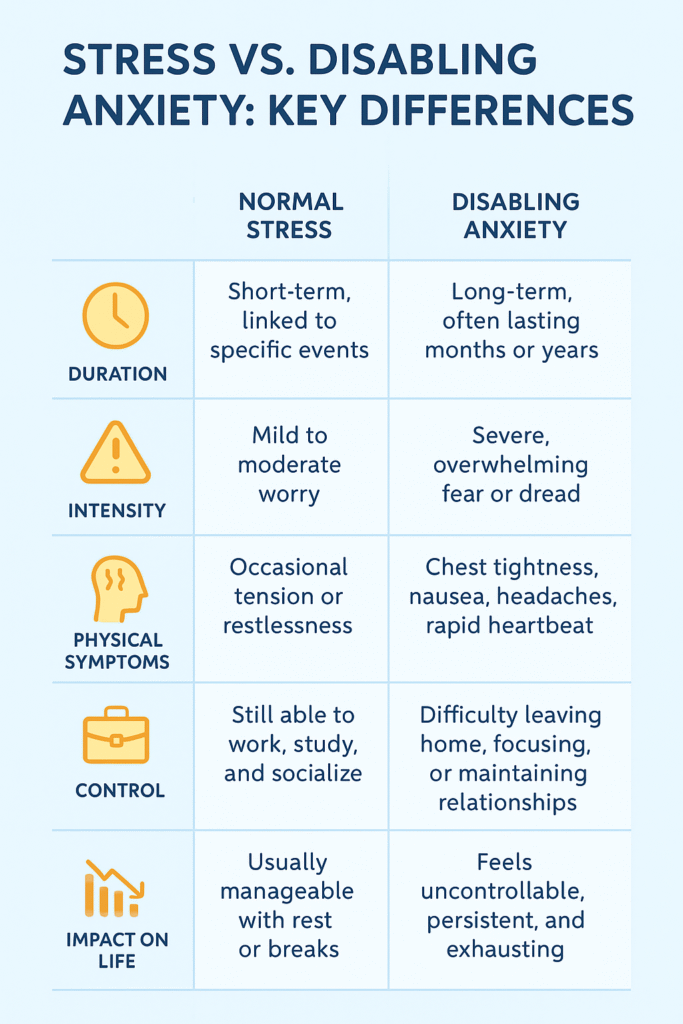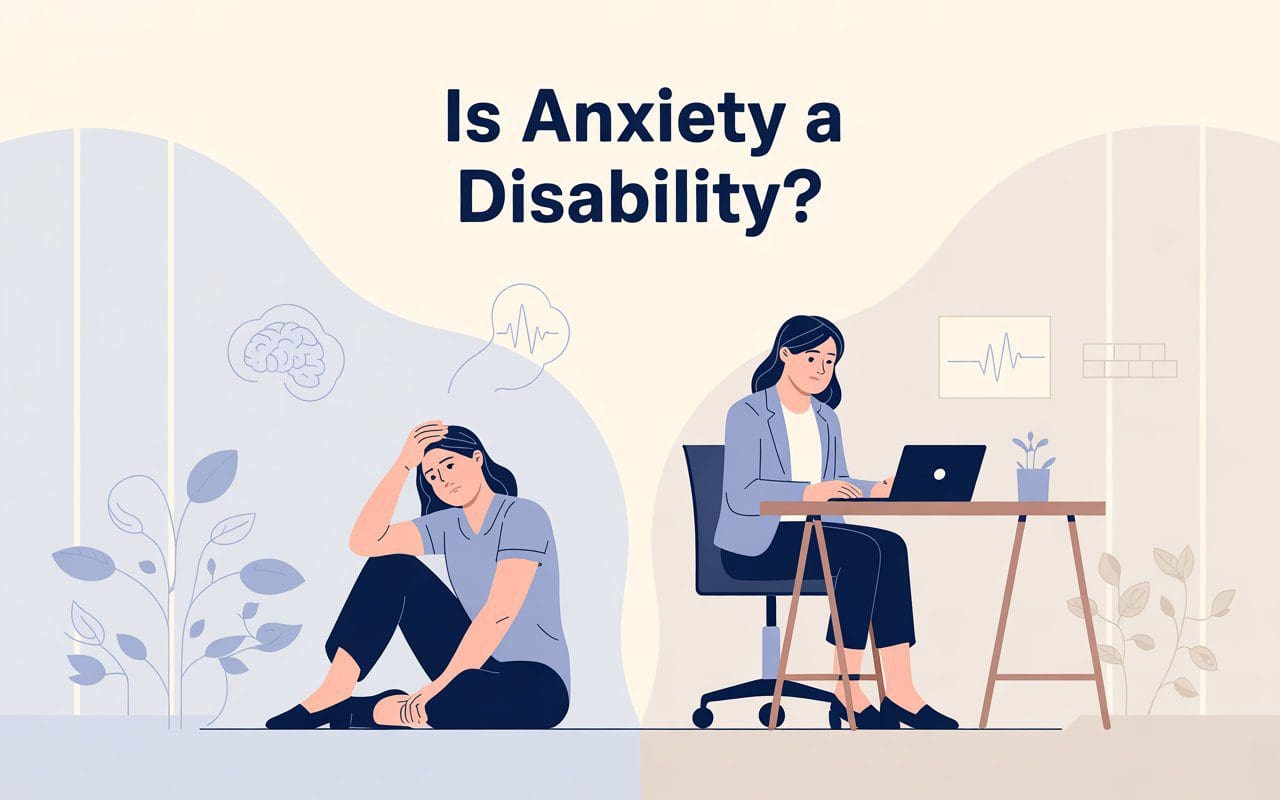Is anxiety a disability?
For millions of people, anxiety feels like a silent storm—one that shakes their confidence, focus, and peace of mind every day. It’s more than just worry or fear; it’s a condition that can affect your body, your thoughts, and your ability to live normally. From chest tightness and nausea to panic attacks and suicidal thoughts, anxiety can become disabling when it starts to control your life instead of the other way around.
Experts from the National Institute of Mental Health (NIMH) estimate that nearly one in five adults experiences an anxiety disorder each year. The good news? Understanding its symptoms, causes, and treatment options can help you regain control and live a balanced, fulfilling life.
🌿 What Exactly Is Anxiety Disorder?
Contents
- 1 🌿 What Exactly Is Anxiety Disorder?
- 2 ⚖️ What Does “Disability” Mean for Anxiety?
- 3 🔎 Types of Anxiety Disorders That May Be Considered a Disability
- 4 📌 Symptoms That Make Anxiety Disabling
- 5 🩺 What Causes Anxiety Disorders?
- 6 ALSO READ
- 7 💊 Adderall and Anxiety: What’s the Connection?
- 8 Coping and Managing Anxiety
- 9 🌈 Conclusion: Anxiety Doesn’t Define You
- 10 🙋♂️ FAQs
- 10.1 Q1. Can I get disability benefits for anxiety
- 10.2 Q2. Does everyone with anxiety qualify as disabled?
- 10.3 Q3. What anxiety disorders are most often considered disabilities?
- 10.4 Q4. Can therapy and medication stop anxiety from becoming disabling?
- 10.5 Q5. Should I inform my employer about my anxiety?
- 11 ⚠️ Important Note
Anxiety is more than temporary stress. Unlike ordinary nervousness, anxiety disorders are long-lasting mental health conditions that can cause:
- Persistent and excessive worry
- Physical symptoms like chest tightness, nausea, or dizziness
- Trouble focusing or sleeping
- Panic attacks or constant restlessness
Moreover, According to the National Institute of Mental Health (NIMH), over 30% of U.S. adults experience some form of anxiety disorder at least once in their lifetime. For some, symptoms are mild. However, for others, they can be so disabling that functioning at work, school, or in relationships becomes nearly impossible.
⚖️ What Does “Disability” Mean for Anxiety?
Under the Americans with Disabilities Act (ADA), a condition counts as a disability if it substantially limits one or more major life activities.
Therefore, If your anxiety makes it hard to focus, work, or perform daily tasks, you may qualify for workplace accommodations or Social Security Disability (SSD) benefits.
For instance, here are some examples of ADA-recognized accommodations:
- Flexible work schedules or remote options
- Access to quiet workspaces
- Modified deadlines or reduced workload during flare-ups
- Permission to take breaks for mental health management
In other words, if anxiety disrupts your everyday functioning, legal support and accommodations can help you manage your condition better.
🔎 Types of Anxiety Disorders That May Be Considered a Disability
Not every case of anxiety is recognized as disabling. However, the following disorders are more likely to qualify, according to the Diagnostic and Statistical Manual of Mental Disorders (DSM-5):
- Generalized Anxiety Disorder (GAD): Ongoing, uncontrollable worry.
- Panic Disorder: Sudden, repeated panic attacks.
- Social Anxiety Disorder: Intense fear of social settings.
- Post-Traumatic Stress Disorder (PTSD): Trauma-related anxiety symptoms.
- Obsessive-Compulsive Disorder (OCD): Unwanted intrusive thoughts and repetitive behaviors.
Each of these disorders, though unique, impacts life differently, Yet symptoms are severe and persistent, they may still fall under legal definitions of disability.
📌 Symptoms That Make Anxiety Disabling
Anxiety isn’t just emotional—it’s physical too. In many cases, the body reacts to mental distress in powerful ways. Here are some common symptoms that may become disabling if left untreated:
- Persistent feelings of dread or panic
- Suicidal thoughts or hopelessness
- Chest tightness or shortness of breath
- Nausea, headaches, or dizziness
- Muscle tension or restlessness
- Trouble sleeping or constant fatigue
As a result, these symptoms can disrupt everyday activities, making anxiety a serious mental health concern rather than a temporary feeling.
🩺 What Causes Anxiety Disorders?
While anxiety can stem from stress, research shows that some people are biologically predisposed to it. In addition, multiple triggers can contribute to its development, such as:
- Genetic factors (family history of anxiety or depression)
- Chronic stress or trauma
- Imbalance in brain chemicals (serotonin, dopamine)
- Substance use or withdrawal
- Underlying medical conditions like thyroid imbalance
Ultimately, understanding these causes is the first step toward finding the right treatment and coping strategies.
ALSO READ
Wearable Technology for the Elderly People
💊 Adderall and Anxiety: What’s the Connection?
Adderall is a stimulant medication primarily prescribed for ADHD (Attention-Deficit Hyperactivity Disorder). However, for individuals with anxiety disorders, Adderall can sometimes make symptoms worse.
This is because it increases dopamine and norepinephrine activity, which can heighten alertness and energy—but also intensify nervousness or panic in sensitive individuals.
For example, if you already experience rapid heartbeat or restlessness from anxiety, Adderall may amplify these sensations. Therefore, it’s crucial to speak with a mental health professional before starting or continuing this medication.
In some cases, doctors may recommend non-stimulant alternatives or a combination of therapy and lifestyle changes to manage both ADHD and anxiety safely.
Coping and Managing Anxiety
Even though anxiety disabling, the good news is that it’s treatable. Here are effective approaches recommended by the American Psychological Association (APA) and other experts:
1. Therapy & Counseling
First and foremost, therapy—especially Cognitive Behavioral Therapy (CBT)—helps reframe negative thoughts and build healthy coping mechanisms. Over time, it trains your mind to respond calmly instead of fearfully.
2. Medication (When Needed)
In addition to therapy, some people benefit from medications like SSRIs or SNRIs, which help stabilize mood and reduce excessive worry. However, always consult your healthcare provider before making medication changes.
3. Mindfulness & Relaxation
Furthermore, techniques such as deep breathing, guided meditation, and progressive muscle relaxation can calm your body’s stress response. Even five minutes a day can make a noticeable difference in how you feel.
4. Lifestyle Adjustments
Healthy habits play a vital role. For instance:
- Exercise regularly to release endorphins.
- Limit caffeine and alcohol, as both can worsen anxiety.
- Maintain a consistent sleep schedule.
- Spend time outdoors or in natural light to lift mood.
5. Build a Support System
Most importantly, don’t isolate yourself. Talking with trusted friends, family members, or support groups can provide relief, perspective, and encouragement when you need it most.
Ultimately, coping with anxiety isn’t about eliminating fear—it’s about learning to live confidently despite it.

🌈 Conclusion: Anxiety Doesn’t Define You
So, is anxiety a disability?
In many cases, yes. When anxiety severely limits your ability to function at work or in daily life, it may qualify as a mental health disability under the ADA or Social Security guidelines.
However, a diagnosis doesn’t define you—it empowers you to seek support, therapy, and accommodations that can transform your life. Remember, anxiety may slow you down, but it doesn’t have to stop you.
Take that first step today—talk to a mental health professional, reach out for support, and believe that recovery is possible. 🌿
🙋♂️ FAQs
Q1. Can I get disability benefits for anxiety
Yes. If anxiety prevents you from working or performing daily tasks, you may qualify for benefits—provided you have proper medical documentation. Check the SSA Disability Benefits website for details.
Q2. Does everyone with anxiety qualify as disabled?
No. Only individuals whose symptoms significantly limit major life activities for a prolonged period may qualify under ADA or SSA rules.
Q3. What anxiety disorders are most often considered disabilities?
Generalized anxiety disorder, panic disorder, PTSD, OCD, and social anxiety disorder—when severe—are commonly recognized.
Q4. Can therapy and medication stop anxiety from becoming disabling?
Absolutely. According to the APA, early treatment and coping strategies often prevent anxiety from worsening.
Q5. Should I inform my employer about my anxiety?
If your condition affects your work, you may disclose it to request accommodations under the ADA. Consulting HR or a trusted supervisor is recommended.
⚠️ Important Note
This article is for informational purposes only and does not replace medical or legal advice. If you are experiencing severe anxiety or suicidal thoughts, please seek immediate help from a qualified professional.
📞 In the U.S., dial 988 to connect with the Suicide & Crisis Lifeline.
🌍 If outside the U.S., you can find international hotlines at findahelpline.com.
